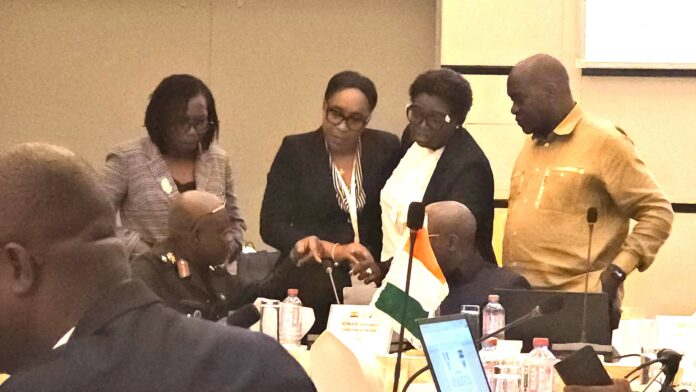On Tuesday, November 5, 2024, the Ghana Boundary Commission and its Côte d’Ivoire counterpart finalized and validated two key framework agreements at a ceremony in Accra.
This historic step follows eight years of negotiations and cooperation between the neighboring nations, building on a 2017 ruling by the International Tribunal for the Law of the Sea (ITLOS) that resolved a longstanding maritime dispute in favour of Ghana.
The two framework agreements address both the maritime and northern land boundaries between Ghana and Côte d’Ivoire, aiming to eliminate further border disputes and strengthen cooperation. The recent validation of these agreements is a testament to the diplomatic efforts made by both nations to preserve peaceful relations and ensure territorial clarity.
The maritime boundary dispute originated from overlapping claims in the oil-rich waters between the two West African nations, which threatened both territorial integrity and economic interests. ITLOS, an international tribunal responsible for adjudicating maritime disputes, delivered a landmark ruling in September 2017 that delineated the boundary, favouring Ghana’s claims. Since then, both nations have collaborated to solidify the maritime boundary framework to prevent future conflicts.
Beyond the maritime issue, Ghana and Côte d’Ivoire have faced challenges regarding the demarcation of their northern land boundary. Tuesday’s agreement reaffirms the land boundaries between the two countries, helping to prevent misunderstandings, accidental trespassing, and disputes that could disrupt relations.
At the conclusion of a two-day conference held to finalize the framework agreements, Major General E.W. Kotia, Commissioner-General of the Ghana Boundary Commission, emphasized the importance of modern approaches in boundary management.
“The reaffirmation and demarcation of boundaries in the 21st century require a shift from traditional methods,” he explained, underscoring the need to focus on cross-border collaboration in alignment with other African boundary commissions.
“Validating this framework agreement is not just about boundary lines; it’s about fostering cooperation and mutual development in border communities,” he added.
Looking ahead, Major General Kotia announced that the Ghana Boundary Commission would begin identifying underserved communities along the country’s borders starting next year. This initiative aims to improve the lives of border residents through essential social interventions, including new schools, healthcare facilities, and water and sanitation projects.
Konaté Diakalidia, Executive Secretary of the Côte d’Ivoire Boundary Commission, commended the commitment shown by both commissions in working toward a peaceful resolution and acknowledged Ghana’s role in prioritizing this initiative.
The validation of these legal frameworks is a step forward in enhancing development, promoting border trade, and ensuring stability for our nations,” he said.
Diakalidia also urged the foreign ministries of both countries to review and sign the agreements for prompt implementation.
The Deutsche Gesellschaft für Internationale Zusammenarbeit (GIZ), a German development agency, has provided consistent support throughout the boundary reaffirmation process. Dr. Bakary Sanou, GIZ’s regional coordinator, expressed satisfaction with the progress, emphasizing the role of this partnership in promoting preventive diplomacy.
“The outcome of your deliberations will not only secure peace but also strengthen the spirit of brotherhood between Ghana and Côte d’Ivoire,” Dr. Sanou remarked.
Dr. Sanou assured both nations that GIZ remains committed to supporting the implementation of the agreements. He further highlighted that peaceful border relations between Ghana and Côte d’Ivoire are essential for regional stability and economic development.
As Ghana and Côte d’Ivoire move forward with the implementation of these framework agreements, they serve as a model for collaborative conflict resolution in West Africa. The agreements lay a strong foundation for enhanced border management, cross-border trade, and shared development initiatives, underscoring the commitment of both nations to foster peaceful, cooperative, and productive relations.
The successful validation of the maritime and land boundary frameworks is expected to pave the way for similar cooperative efforts across the continent, demonstrating that diplomacy and collaboration are essential for achieving sustainable peace and regional integration.
Read also:
Increased ground water extraction can cause sudden sinking of the earth’s surface – Marine Expert













